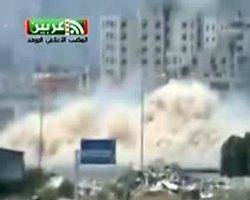Members of a dominant Kurdish party have opened fire at a protest in the Syrian Kurdish-dominated town of Amuda, killing at least three people and leaving at least 10 others injured, activists have told Al Jazeera.
Thursday's rally was held to protest against the detention of three prominent Kurdish activists by the Democratic Union Party (PYD), an armed group that controls much of the Kurdish areas in Syria's north and northeast.
Activists posted footage online purporting to show a protest being dispersed amid sounds of heavy gunfire.
Kurdish website Firat News, meanwhile, said an "armed gang" shot at People's Defense Units (YPG), a group made up mainly of PYD fighters and responsible of the security of Kurdish areas. The website, citing YPG Press Office, said one YPG fighter was killed.
"Clashes in the area broke out after YPG units surrounded the city and denied access into and out of it following the attack by the armed group," the website said a day after the reported attack.
Rallies and sit-ins in the town, located in Hassaka province, broke out on June 17, following the arrests by PYD of the activists supportive of the Syrian uprising against Bashar al-Assad.
Tension has been running high between the PYD and Kurdish anti-Assad activists, but Thursday's violence was a rare bloody confrontation.
The opposition says the PYD has been collaborating with the regime, even though it is critical of the Assad government.
The PYD accused the three detained activists of drug dealing.
Mohammad Mahmoud Bachar, a local journalist in Hassaka, told Al Jazeera this was “a silly accusation”.
"The activists are well known in Amuda," he said. "They have been active since day one of the Syrian uprising. Since their arrest, camps have been set up in the city centre and several activists went on hunger strike in protest.”
Bachar said some of the injured were being treated in the “underequipped” Dari Hospital in Amuda. Others were smuggled to Turkey for treatment, he said.
The PYD - affiliated with the Kurdistan Workers' Party (PKK), an armed group designated as a terrorist organisation by Turkey, the US and the EU – said the three activists were detained for drug dealing.
Silencing opposition
Azad Amoudi, a 31-year-old teacher in Amuda, told Al Jazeera there has been a wave of arrests in order to silence opposition Kurdish activists and parties.
“But they cannot stop us from protesting against Assad. Amuda was the number four town in Syria to hold rallies against the regime,” he said.
Amuda, a town with about 50,000 residents, has seen several anti-Assad protests since the uprising against the regime began in March 2011, and some protests were brutally quelled by regime troops.
In July 2012, Assad’s forces withdrew from the town, allowing for the PYD to take responsibility for security.
In an attempt to unite the divided Kurds, The PYD last year agreed to join with other groups and form Kurdish Supreme Committee, the governing body for the Kurdish areas.
People's Defense Units (YPG), the armed wing for the Committee, was created to protect the areas from both Syrian opposition forces and regime forces.
“At the beginning, we were happy with the YPG because they promised to protect the Kurdish towns. But it turned out that the PYD dominated the Committee and the YPG were solely members of the PYD,” Mohammad Ali, a Kurdish activist based in Turkey, told Al Jazeera.
“They are using the committee as a cover to exert power,” he said, adding that he expected the latest incidents would lead to an escalation among the Kurds.
Amoudi told Al Jazeera the PYD was popular among residents at the beginning, but its crackdown on activists has turned people against it. “It is now ruling with the power of weapons,” he said.
Kurds are the largest ethnic minority in Syria and make up about nine percent of the country's population. They have faced discrimination and harassment for decades by the regime.
PHOTO CAPTION
Damascus under attack by Syrian regime forces
Aljazeera


 Home
Home Discover Islam
Discover Islam Quran Recitations
Quran Recitations Lectures
Lectures
 Fatwa
Fatwa Articles
Articles Fiqh
Fiqh E-Books
E-Books Boys & Girls
Boys & Girls  Women
Women

 Vote
Vote








